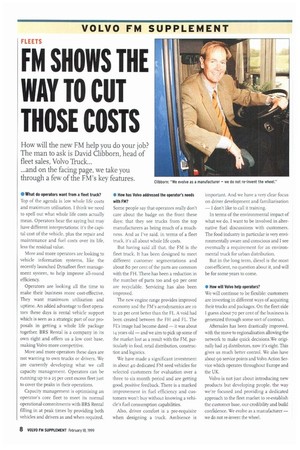FM SHOWS THE WAY TO CUT THOSE COSTS
Page 108

If you've noticed an error in this article please click here to report it so we can fix it.
How will the new FM help you do your job? The man to ask is David Clibborn, head of fleet sales, Volvo Truck...
and on the facing page, we take you through a few of the FM's key features.
• What do operators want from a fleet truck? Top of the agenda is low whole life costs and maximum utilisation. I think we need to spell out what whole life costs actually mean. Operators hear the saying but may have different interpretations: its the capital cost of the vehicle, plus the repair and maintenance and fuel costs over its life, less the residual value.
More and more operators are looking to vehicle information systems, like the recently launched Dynafleet fleet management system, to help improve all-round efficiency.
Operators are looking all the time to make their business more cost-effective. They want maximum utilisation and uptime. An added advantage to fleet operators these days is rental vehicle support which is seen as a strategic part of our proposals in getting a whole life package together. BRS Rental is a company in its own right and offers us a low cost base, making Volvo more competitive.
More and more operators these days are not wanting to own trucks or drivers. We are currently developing what we call capacity management. Operators can be running up to a 25 per cent excess fleet just to cover the peaks in their operations.
Capacity management is optimising an operator's core fleet to meet its normal operational commitments with BRS Rental filling in at peak times by providing both vehicles and drivers as and when required.
• How has Volvo addressed the operator's needs with FM?
Some people say that operators really don't care about the badge on the front these days; that they see trucks from the top manufacturers as being much of a muchness. And as I've said, in terms of a fleet truck, it's all about whole life costs.
But having said all that, the FM is the fleet truck. It has been designed to meet different customer segmentations and about 8o per cent of the parts are common with the FH. There has been a reduction in the number of parts too and 90 per cent are recyclable. Servicing has also been improved.
The new engine range provides improved economy and the FM's aerodynamics are to to zo per cent better than the FL. A void had been created between the FH and FL. The FL's image had become dated — it was about 14 years old — and we aim to pick up some of the market lost as a result with the FM. particularly in food, retail distribution, construction and logistics.
We have made a significant investment in about 40 dedicated FM seed vehicles for selected customers for evaluation over a three to six month period and are getting good, positive feedback. There is a marked improvement in fuel efficiency and customers won't buy without knowing a vehicle's fuel consumption capabilities.
Also, driver comfort is a pre-requisite when designing a truck. Ambience is important. And we have a very clear focus on driver development and familiarisation I don't like to call it training.
In terms of the environmental impact of what we do, I want to be involved in alternative fuel discussions with customers. The food industry in particular is very environmentally aware and conscious and I see eventually a requirement for an environmental truck for urban distribution.
But in the long term, diesel is the most cost-efficient, no question about it, and will be for some years to come.
• How will Volvo help operators?
We will continue to be flexible: customers are investing in different ways of acquiring their trucks and packages, On the fleet side I guess about 70 per cent of the business is generated through some sort of contract.
Aftersales has been drastically improved, with the move to regionalisation allowing the network to make quick decisions.We originally had 25 distributors, now it's eight. This gives us much better control. We also have about 90 service points and Volvo Action Service which operates throughout Europe and the UK.
Volvo is not just about introducing new products but developing people, the way we're focused and providing a dedicated approach to the fleet market to re-establish the customer base, our credibility and build confidence. We evolve as a manufacturer — we do not re-invent the wheel.
















































































































